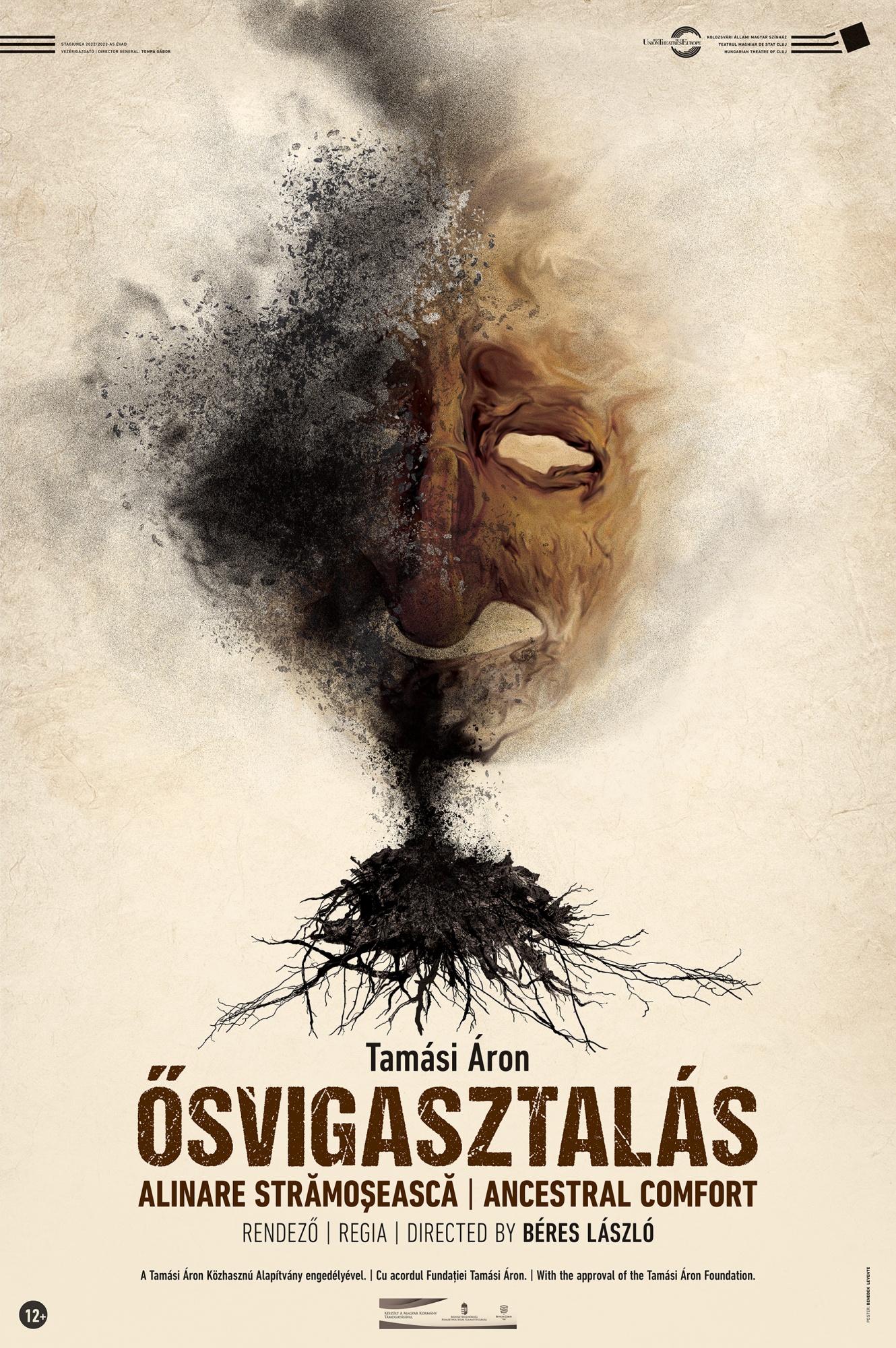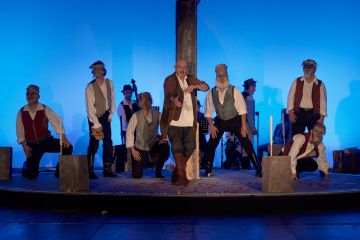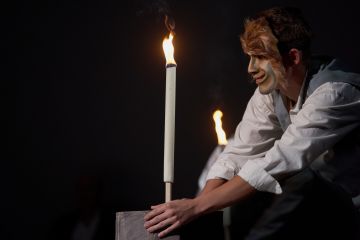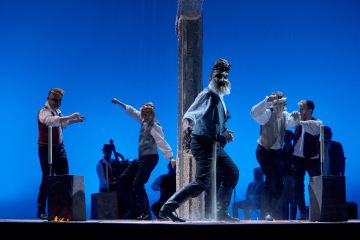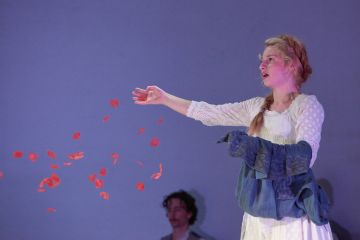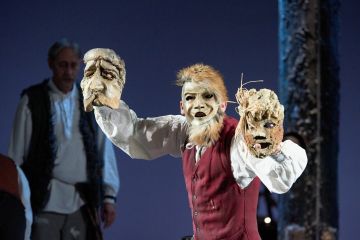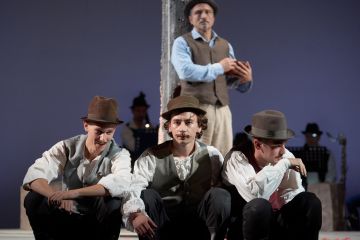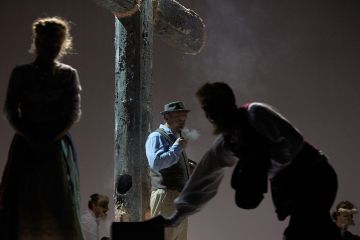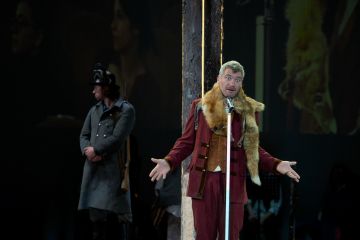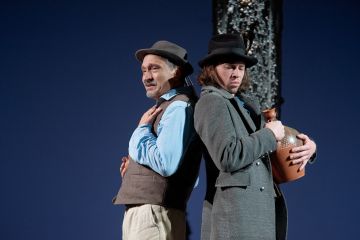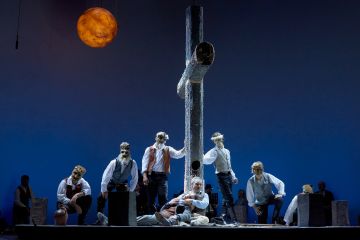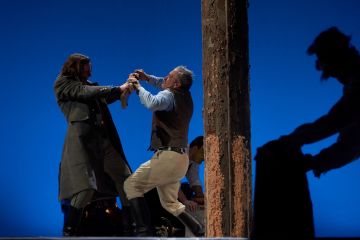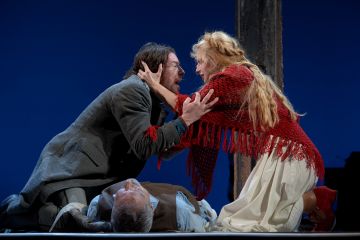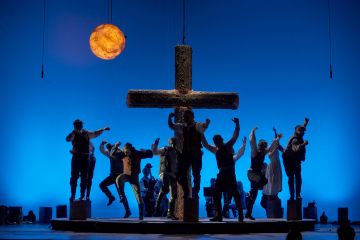1h 30' without intermission
Ádám Csorja, ancestral primogenitor
Zsolt Bogdán
Ambrus Csorja, his elder brother
Attila Orbán
Jula Kispál, orphan girl
Eszter Román
Márton Botár, her stepfather
Áron Dimény
Bence Gálfi, young constable
Tamás Kiss
Village notary
Loránd Farkas
Village judge
Róbert Laczkó Vass
Judge of the court, constables, choir
Ferenc Sinkó
Prosecutor, constables, choir
Csaba Marosán
Barrister, constables, choir
Zsolt Gedő
Three lads, choir
Gellért Ábrahám, Hunor Fazakas, Botond Tulogdi
directed by
László Béres
set and costume design
Gyopár Bocskai
music composed by
Tibor Cári
choreography
Attila Bokor
musicians
Attila Antal, Zoltán Balázs Gyenge, Enikő Tatár
director's assistant
Alpár Fogarasi
stage manager
Enikő Albert, Böjthe Pál
The Szekler mentality is represented by the archetypal hero Adam Csorja, played by Bogdan Zsolt with a stubborn determination against the evil forces manifested by the governing authorities. He illustrates what a village lad says at one point, namely that "the Szekler has a twisted mind". Despite the parody of behavior, through religion and belief in unwritten laws, the Szekler is a profound, rigid man, hard to mold according to other ideologies. A few anecdotes of the Szeklers are slipped in, but the tragic background is kept heightened throughout this essay on mourning the dead, love, respect and religiosity. The trial scene is added precisely to contrast the new world with the breaking of traditions.
Adrian Țion: Un teatru baladesc al valorilor ritualice [A Balladesque Theatre of Ritual Values], Făclia, December 20, 2022
In the role of Ádám Csorja, Zsolt Bogdán once again creates a memorable role, his deeply felt performance contains all the pain, unwavering faith and characteristic humour of the Szekler man. Although the actor was born in Csíkszereda, he confessed that he carries his Szekler identity under his skin, yet he approached Tamás from afar, and that it is extremely difficult to marvel at this world and validate it. Judging by the audience's reaction, the excellent artist succeeded very well. We have seen several successful productions directed by László Béres in Cluj, and the audience was not disappointed this time, either.
Csaba Nánó: Mivel vigasztalódik a székely ember? – Tamási Áron drámájának bemutatója a Kolozsvári Magyar Színházban [What comforts the Szekler man? - Premiere of Áron Tamási's drama at the Hungarian Theatre of Cluj], erdelyinaplo.ro, October 15, 2022
We cannot do anything else, we seek comfort from our ancestors, or if we do not find a direct path to the ancestors, we can still find help in dance, music, objects that can connect and bring us closer to tradition, to the ancestors.
(...)
The sudden, but not collapsing, but rather jerky, departure of all power and life from the arms of Ambrús Csorja (Attila Orbán) condenses Ambrus Csorja's entire life into a single gesture. The way in which he dies sitting down, from one moment to the next, also explains the subsequent events, the speed of Ádám Csorja's (Zsolt Bogdán) further actions, as well as the dramaturgical adjustment that the dead man is not pulled out of the scene with his bed, but leaves on his own legs, so to speak. And this departure on his own feet also raises the possibility that those who walk in the mask and disguise, whose faces are now stiff and immobile, are just as dead as the once powerful Ambrús Csorja, the last one still in touch with the sources of tradition.
Other traditions also appear in the performance: the funeral procession, the communal prayer, the dance of the men that stand as soldiers. All these help, could help, to experience the allusions in Tamási's text, the importance of each tradition, the importance of their preservation.
Zsolt Karácsonyi: Ősök, nézők, két vigasztalás között [Ancestors, spectators, between two comfortings], Helikon, October 25, 2022.
The Cluj performance of Ancestral Comfort is an engaging, thought-provoking experience that once again demonstrated the outstanding work of the actors and team of the Cluj company. Protagonists and university students displaying flashes of mood are well-matched elements of a large whole, the collaboration of older and newer members of the company resulting in a cohesive, beautiful performance that was a great hit with the audience.
Márta Bodó: „Komor és darabos vázlatból” közönségsikert hozó előadás ["From a gloomy and fragmentary sketch"], Szabadság, January 18, 2023.
Date of the opening: October 05, 2022
Initially considered lost, Áron Tamási's play was only brought to public attention in the 1970s, often puzzling theatre-makers and audiences alike, as long before his time, Tamási revealed the potential of modern Hungarian drama in his Ancestral Comfort, comparable to the atmosphere and message of important works of world literature such as Federico García Lorca's Blood Wedding or Yermas. However, Tamási's initiative is unique in Hungarian dramatic literature, as this trend has so far failed to develop, which is why we often encounter difficulties when we want to relate to this work based on the popular traditions of the Szekler people, which evokes the cult atmosphere of ancient pagan rituals.
The plot begins with the death of Ambrus Csorja himself, whose last wish is to be burnt by his brother. Ádám grants his wish, but this unusual act leads him to be suspected of fratricide, for which he is imprisoned. Bence Gálfi helps him escape from prison, but when he learns that they are both in love with the same girl, Jula Kispál, Gálfi kills Csorja. The deaths of the Csorja brothers follow one another, but the depiction of their tragedy transcends the thread of the plot, as Tamási uses the story to seek answers to questions such as the conflict between tradition and everyday life, faith and belonging, harmony and chaos, and how ancient traditions embrace the harmonious relationship between man and nature and the consequences of abandoning this relationship.
With the approval of the Tamási Áron Foundation.












